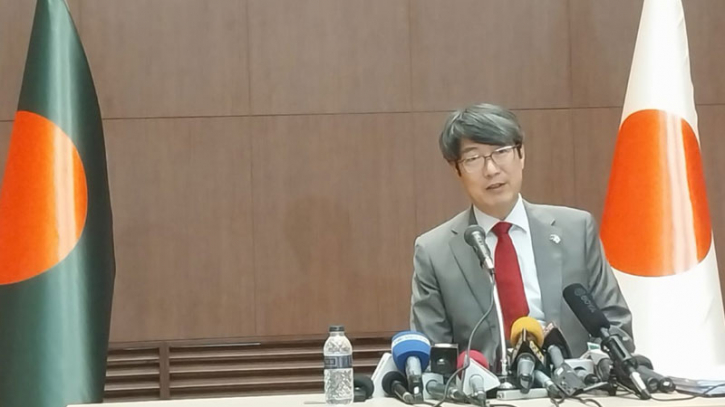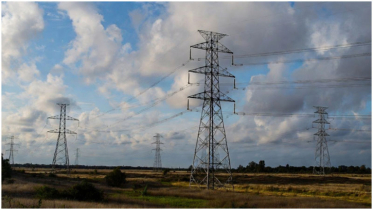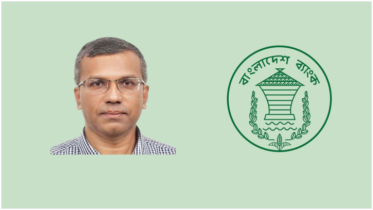Japan to invest more in Bangladesh, hire skilled manpower: Envoy

Ambassador of Japan to Bangladesh Iwama Kiminori has expressed his country's desire to expand the dimensions of cooperation with Bangladesh as bilateral relations between the two countries have been elevated to a strategic partnership, marking an important milestone.
In an interview with The Business Standard, Iwama Kiminori touches upon several significant topics, shedding light on potential Japanese investments in Bangladesh.
Japan is a long-term friend of Bangladesh and since our independence, Japan has been helping us in developing our economy. We are grateful to you for that. Last month, the prime ministers of these two countries met and had bilateral talks in which they wanted to elevate our bilateral relationship to a strategic partnership. What actually will be the difference?
Just a couple of days ago I made a presentation about what has changed and what has not. In 2014, the late prime minister of Japan Shinzo Abe and Bangladeshi Prime Minister Sheikh Hasina agreed on a joint statement on a comprehensive partnership agreement. If you compare the document of 2014 and the current one, you will find that the basic structure remains the same.
We would like to enhance our relationship on three pillars – firstly, the political pillar which will work to ensure peace and stability in this region as well as in the global arena; secondly, economic cooperation and economic development should be enhanced between the two countries; and thirdly, we would like to expand people-to-people exchange. These three pillars are the same but what has changed is that maybe we can widen the scope of cooperation.
For example, when it comes to the economy, in 2014 the focus was mainly on development assistance. But in 2023, in the strategic partnership agreement, although we stressed development assistance and infrastructural development, there is an additional focus on trade and development.
Now that Bangladesh is aiming at being a middle-income country and aiming to be a developed country by 2041, we are aiming to be mutually beneficial equal partners to enhance trade and investment. According to my understanding and my interpretation, this is a deepening of our economic relationship.
You talked about trade and investment, but we do not see many investors coming. The last big one was Japan Tobacco. Why is the investment level so low? Our exports to Japan are also low. In recent times, we have sent garment products to Japan but the amount is not that high. Japan is a big market. What can be done on this front? Can you give us information on any big investment that may come to Bangladesh?
It is true that in comparison with investors or trade partners like the USA or other European countries, the volume of Japanese business in Bangladesh is not so big. If you look at the tendencies, you will find that there are a growing number of Japanese companies which are stationed in Bangladesh even though the number itself is not so big. You talked about what might be the reason for that. I can suggest to you that the main obstacles to inviting Japanese investments are, for example, the complex approval procedures and the delay in customs clearances.
There are many obstacles for Japanese investors to invest in Bangladesh. In general, Japanese people are very cautious, but once they decide anything they will do it thoroughly. You talked about big investments. As you may have heard, we established the BSEZ, the special economic zone in Narayanganj's Araihazar upazila in December last year.
Even though the real number of investors at this moment is not so big, as far as I have learned from the project manager, the demand and inquiries are very big. I cannot say specifically about any company but I can say that the trend is there, the mood is there.
The Japanese prime minister has announced a $75 billion infrastructure and security investment in the Indo-Pacific region. I think Bangladesh is also a part of that plan. How actually will the money be spent and how will it shape the region? What is the vision actually?
Maybe you have heard our prime minister's policy speech in India describing his vision for the future of the Indo-Pacific region. He spoke very roughly about that figure. There is no specific decision on the allocation for specific countries like Bangladesh or India. Our commitment is based upon the request of each and every country.
So, I cannot say how much allocation Bangladesh will get. If you look at infrastructural development, so many things are happening. We are constructing terminal three of Dhaka Airport, metro railways, we have opened line six and we will continue to do so in line one and line five and so on.
Last but not least, the Matarbari Deep Seaport is a very big project. So, all in all, we are committed to a huge investment in infrastructural development and we will continue to do so.
Is there any specific big infrastructure investment in the pipeline right now? Can you name any project?
At this moment we are concentrating on finalising our already committed infrastructural development plans.
Japan has an ageing society. Japan is also a very conservative country in terms of immigration. This means that you really need a lot of skilled manpower and also non-skilled labour for the country's development. Do you see any scope for a bigger migration of manpower from Bangladesh to Japan?
If we look at the statistics, we will find that we are facing an ageing society. I have heard from Japanese business people that they need a talented and skilled labour force. We have a framework for receiving certain categories of the skilled labour force from Bangladesh. We have already started an efficiency test for two categories – the agriculture sector and the nursing sector.
I believe there will be opportunities for receiving labour in these categories from your country. But demands are very high. I have talked with other colleagues from other sectors of the business community. There is a huge demand for ICT sectors. There have already been so many projects and so many moves through which young, talented ICT people from Bangladesh will visit and work in Japanese companies. I think in the years to come the scope will be widened.
Has any batch of caregivers and nurses gone to Japan?
As I have mentioned, the framework is there and we have just started to utilise the framework. So I cannot say exactly about the numbers.
It seems that Asia has become a new battleground with China on one side and AUKUS, Japan, the USA, and India forming an alliance on the other side. Do you see the tension rising in the region? And how will it affect our growth? We are scared about Ukraine already. Another conflict will greatly harm the global economy. So how do you look at these things?
First of all, I don't want to make any sweeping generalisations about Asia. You are right that in some regions we are seeing instability. For example, if we look at our surrounding areas, if we look at North Korea, we are suffering from the very frequent launching of missiles from North Korea towards Japan. So, there are several hotspots. But the important thing is how we can manage the hotspots and in what way.
What our prime minister emphasised in the policy speech is that even though we advocate a free and open Indo-Pacific initiative, his message is very clear that he emphasises inclusiveness. He would like to promote connectivity so that Japanese companies can contribute to the assurance of peace and stability for this region.
And what we want to do is to deal with individual regions or individual areas. We will definitely maintain peace and stability in various ways – through security measures, a stable economy, and people-to-people exchange. These measures will alleviate the tension. Our policy is to have all factors working in a combined way.
Source: The Business Standard
.png)




